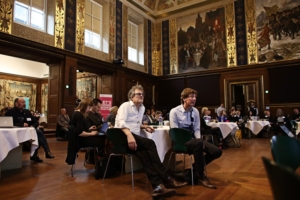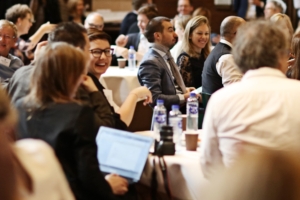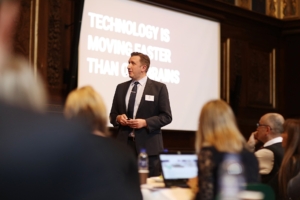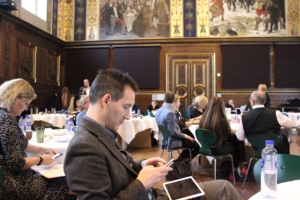Text & photo: Eva Vestrheim
How do we communicate via technology? How has our relationship to technology evolved through the last 40 years? Have we lost our way? How can we create an optimal usage that benefits us in the long run?
At the conference Communication and Technology, held at Copenhagen University in April 2018 organized by K1, IABC and EACD, many aspects of communication related to technology were debated. In this article I will focus on the art of mastering technology interpersonally.
The overall focus of the conference was to emphasize the importance of not neglecting the human side amongst all the technology of today.
This point was highlighted in a number of different contexts throughout the conference. 
Use and abuse
The early years of the digital age were characterised by an innocent curiosity and a playful experimentation with a brand new toy, though it is seen that the use has developed into an abuse for many; in worst cases it has become a highly addictive behaviour.
What was meant as a convenient tool in our everyday life is becoming a time-consuming addiction that is in the process of taking over our life, our identity and social connections. Moreover, the technology that was intended to ease our lifestyle has become a determining stress factor. Let’s face it that was never the intention. The recent focus on fake news, stress, loneliness and isolation, distraction and social disability among individuals are some of the disadvantages we face as a consequence.
Empowerment & technology
When we are insecure in ourselves and as we doubt our own choices, we seek authorities from whom we expect answers. Thereby, the computer has become our authority in the digital age. Willingly, we submit ourselves to the power of technology which again reflects a repetitive pattern to submit ourselves to a superior. We become victims and blame technology for inconvenient consequences, still allowing it to manipulate our choices in the loss of its objectivity.
The mobile that was invented as a mobile tool has made us immobile
A majority expects technology to solve several problems; we expect the internet to be our guide, doctor, psychologist, sex therapist, psychiatrist. We expect to find the love of our life on the web, we expect to have our emotional needs, desires and dreams fulfilled. We are transformed into lazy and confused creatures, dependent on the web and its possibilities to an extent that we have lost control. This again has created a lack of confidence in our own knowledge, decision making, competences and mastery of skills. Google is a brilliant example of this, as whenever we doubt a question, a definition, an illness, we use google as our guidance, hence google has become our prime authority and we delimit ourselves in favour of the “omniscient and all-knowing” google.

“Technology exists for people. We worry about technology because we lack confidence in ourselves, and imagination for the future.” Jack Ma PGM
Less is more
As curious creatures we seek out as much information as possible though we are not capable of perceiving nor digesting that much information. We make better decisions with less information, as we lose ourselves and our focus with too much stimuli. The brain is excellent at scanning though we lose our mental and physical presence in the information overload.
 Chuck Gose is presenting at the conference
Chuck Gose is presenting at the conference
The mind matters
According to Chuck Gose, strategic advisor for SocialChorus, “the basic problem with technology is that it is moving faster than the brain.” Consequently, we lose confidence in ourselves, our competences and mastery of skills. Though, we forget that the computer can never invent, it can only repeat although the repetition happens at a faster pace.
Subsequently, we are reminded that we are relatively slow thinkers, limited, ineffective and inefficient, hence we regard the computer as a competition, i.e. technology is taking our jobs etc. We teach the computer the processes and “the computer even turns out to be better and faster than us”, argues Ajaz Ahmed, Founder, AKQA.
Though, the future is not something that happens to us, the future is something that we create. If we embrace the change instead of neglecting it, we may perceive the computer as a complementary rather than competition.
Moreover, we forget that technology works on a logical level while human beings function on an emotional level, we are emotional creatures. As strategic advisor, Chuck Gose expresses, “our brain remembers emotion, our brain loves humour and endeavours recency”. Chuck emphasises that “creativity is a risk, but we have to take risks in order to succeed”, as it is the skill of creativity that makes us superior to technology.
 Frue Plads, Festsalen, Copenhagen University
Frue Plads, Festsalen, Copenhagen University
Creativity, imagination and logic
“Creativity is intelligence having fun” Albert Einstein
According to Ajaz Ahmed the most unique characteristics of human beings are imagination and creativity. Imagination and creativity are the superpowers of humans, characteristics which distinguishes us from computer technology and the logical sphere. The uniqueness of the computer is its learning and memory capacity and its tremendous fast pace. When using these powers intelligently; advanced technology combined with human creativity and imagination, we can rock!
Emotional and logical perception – digital insanity
We are about to give technology the authority to rule our lives, and as it has given us many solutions already, consciously or unconsciously we expect the computer to fulfil some of our emotional needs that are not meant to be accomplished by the web.
Especially in Asia, the web dating scene have reached a point where one can actually marry a fictional, virtual fiancée through applications. This is an extreme example of how we have lost sense of ourselves, and our basic needs in accordance with Maslow’s pyramid.
The danger zone seems to be that we have become customised with the information overload and a 24/7 accessibility, additionally, we except the computer to operate at an emotional level and give us emotional fulfilment on an ever-present availability. This is absurd.
An extreme example of this is Japan, where real-life physical and sexual relationships among the youth has become the rarity and are happening comparatively at the lowest rate worldwide. Now we are really talking sidetrack and escape.
https://www.information.dk/udland/2013/10/hvorfor-unge-japanere-holdt-sex
Stagnation of our social capital
In worst cases, we are losing track of our ability to make decisions and we are losing track of our intimate relationships. We are devaluating our social skills and ability to relate. We are losing our intuition. Somehow, we are depowering ourselves, losing trust in our capacity to master our lives.
Never before have people suffered from stress and isolation to an immeasurable extent due to the web’s substitution of physical communication, social interaction and sexual nourishment.
Technology and the digital space were created to connect us on a global level as it eliminates time and space paving the way for a quality of timelessness and presence across borders, though it is also creating social alienation and distance between human beings. Technology can bring us closer if we come to master the art of connecting over the web.
Insecurity & trust
Fortunately, we are slowly changing our awareness about what really matters to us, realising that social media has a negative impact on us due to its superficial quality, making us more distant towards one another and making us more lonely and isolated. The physical connection and presence that nourish us as human beings are absent in a social media context as we cannot sense, touch nor feel the other person.
Hopefully, we are beginning to understand that technology is good for logic and learning, though we should never substitute digital media relationships with the power and beauty of presence, synergy and chemistry between real human beings. The nourishment of feeling and being with other humans cannot be substituted by likes on social media, as the gap between us are only widening, creating mistrust. This is a tremendous pitfall of the computer co-dependency that will not be elaborated in all aspects here.
Ideally, we should avoid being personally involved and emotionally stimulated by digital stuff, though empower ourselves and master technology’s logic intelligence and make our creativity flower with it.
When human interaction and communication are substituted by a virtual meeting place and social media profiles, we are becoming more protective and incompetent in the actual face- to -face communication, hence, we are losing the depth of real-life relationship and we are distancing ourselves from our essence and true values.

